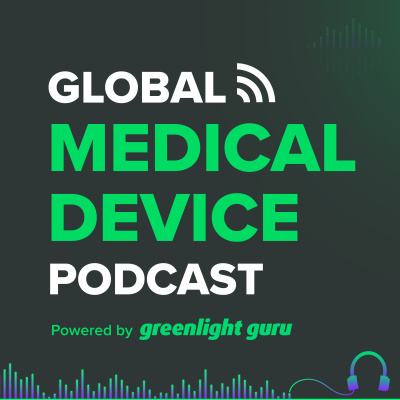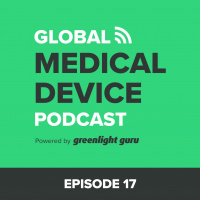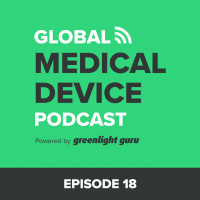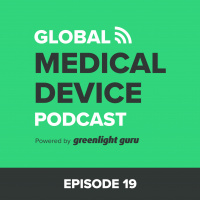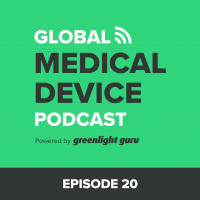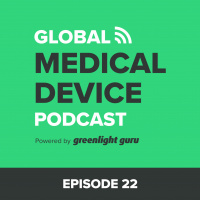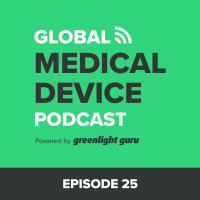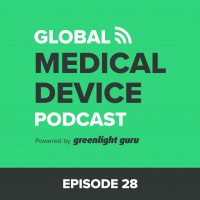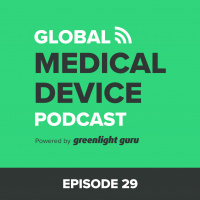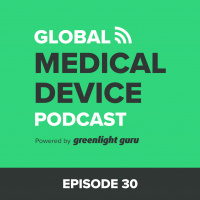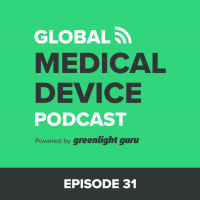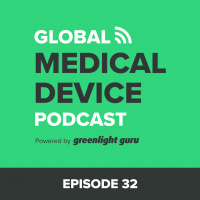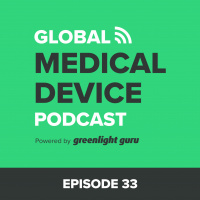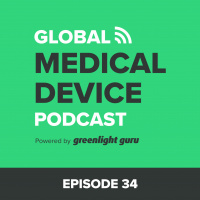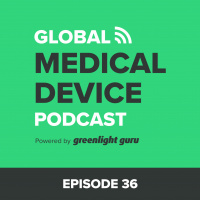Synopsis
The Global Medical Device Podcast powered by greenlight.guru is where today's brightest minds in the medical device industry go to get their most useful and actionable insider knowledge, direct from some of the world's leading medical device experts and companies.
Episodes
-
How to Avoid Medical Device Product Development Wipeouts with Meghan Alonso
07/11/2019 Duration: 27minGetting started in the medical product development process can be a huge undertaking. You might have an excellent idea, but maybe you’re unsure about where to start. Whether you’re just beginning to research, you’re starting to look for development partners, or you’re almost ready to start the manufacturing phase, having someone on your side who can advise you every step of the way is essential. Today we are talking to Meghan Alonso, the CEO of Imua Services, a company devoted to medical device product development firm, and host of the Inspired by Imua podcast. Meghan has a varied background in the medical field. She started out working with injured athletes during the time that she coached gymnastics. She began working at a general orthopedic rehabilitation clinic, and from there, she says she fell in love with medical devices and the impact that they were having on her patients. Since 2012, she’s been helping companies with their innovations. Meghan earned her B.S. from Texas A&M University and her
-
Integrating Business Elements into Your Product Development Process with Therese Graff
07/11/2019 Duration: 29minOn today’s episode of the Global Medical Device podcast, we’re talking about the importance of incorporating business elements into your medical device product development process. When firms focus only on design controls, they may not experience the growth expected, which can lead to a surprisingly low bottom line. Today we are discussing this situation with Therese Graff, a partner with Strategy 2 Market, which is a boutique consulting firm located in Chicago specializing in new product development. “Design control is just good engineering practices... engineering common sense... The business case... allows me to define whether it makes economic sense to build the product.” - Therese Graff Therese has an impressive background in project management and project consulting. She earned her Bachelor of Science at the University of Illinois and her MBA at the University of Chicago. She’s a project management professional, certified with the Project Management Institute, and a new product development profes
-
What Device Makers Need to Know About Design Verification and Validation with Mike Drues
07/11/2019 Duration: 31minHere’s a question for our listeners: When it comes to making sure your medical devices are safe and effective, is it more important to find the right answers or to ask the right questions? In this episode of the Global Medical Device podcast, we are delving into everything related to design verification and validation, which is often called the V&V. We discuss why V&V is so important, the major differences between verification and validation, how they fit into your approval process and more. Today we’re talking to a familiar guest and medical device expert Mike Drues, president of Vascular Sciences. “We need to focus on asking the right questions. V&V is all about demonstrating what’s safe and effective.” – Mike Drues Mike works for and consults with medical device companies located all over the world. He also works with the US FDA, Canada Health, and other regulatory and government agencies in the US, Canada, Europe and elsewhere in the world. “When working with the FDA, tell, don’t ask. Le
-
Tips to Help You Prepare for an FDA Inspection
07/11/2019 Duration: 29minOn today’s episode, we’re introducing the newest addition to the greenlight.guru team, Jessica Lyons. Jessica is a 2007 graduate of Rose-Hulman Institute of Technology and has worked in the medical device product development for nearly 10 years. She worked in custom integration at Beckman Coulter, then worked on getting medical devices transferred to manufacturing at CRI, a medical device contract manufacture. Jon and Jessica are discussing FDA inspections. “It doesn’t matter your size, shape or how long you’ve been around. You’ll go through an FDA inspection.” – Jon Speer No one looks forward to having the FDA come to inspect their facility, but you always need to be ready for it, as you might be subject to an inspection as frequently as every two years. We want to put your mind at ease by giving you information on how to best prepare for FDA inspections, which can take a minimum of five to seven days. “The FDA seems to find the one piece of information you wish they wouldn’t.” – Jessica Lyons Some o
-
Dirty Devices and Reprocessing: Are New Design Change Rules On the Horizon?
07/11/2019 Duration: 27minAs medical device developers, it is our responsibilities to make sure that our products are safe and effective. Unfortunately, the recent high profile cases of antibiotic-resistant superbugs spread by tainted endoscopes that have sicken many have called into questions whether there needs to be new regulations to prevent future infections. “If you have a device that is designed to be cleaned or reused, should not some of the design inputs include reprocessability requirements?” - Mike Drues Today we are speaking with a familiar guest Michael Drues, Ph.D. about the recently published guidance document released by FDA for reprocessable medical devices. Mike was one of several people who was invited to present at the panel meeting at FDA on this topic last year. “What good is the regulation if it’s not realistic?” - Mike Drues Mike is the president of Vascular Science, as well as a consultant for the FDA, Canada Health and other worldwide regulatory organizations and medical device companies. Due to his w
-
Preparing Your Class II Device for the UDI Compliance Deadline with Gary Saner
07/11/2019 Duration: 22minIf you are part of an organization developing or producing Class II medical devices, you should know that on September 24, 2016, your UDI submissions are due to the FDA. “I don’t mean to scare anyone, but we only have 78 working days left.” - Gary Saner UDI stands for “unique device identification,” and the new labeling regulations have been put into place to increase patient safety, reduce medical errors, and provide a foundation for secure global distribution of devices. Today’s guest, Gary Saner, is an expert on UDI submissions and other regulatory topics. As the Senior Manager of Information Solution at Reed Tech, Gary is speaking to us today about the UDI submission procedures and other relevant topics. “The UDI submission is not a one-time effort.” - Gary Saner With over 30 years’ experience in software management and data conversion, Gary is the go-to person if you have questions about UDI, and his company can help medical device companies of any size be sure that their submissions are in order.
-
Insights Into the New FDA 3D Printing Guidance & How It Impacts Med Device New Product Development
07/11/2019 Duration: 31min3D printing can impact new product development and manufacturing. It’s a technology that is hot in many different industries, including medical device development. It’s been around for several decades, and now more than 85 devices are on the market that have been 3D printed, including a 3D-printed medication. While it’s not a new technology, there are new guidance considerations from the FDA on this subject. Mike Drues, President of Vascular Sciences, works with overseeing organizations including Health Canada and the FDA and helps people in the medical device industry navigate regulations. He’s worked with 3D printing for a long time, and he has a lot of valuable insight to share. Some of the topics that you’ll hear about on today’s episode include: ● Why 3D printing matters from an FDA standpoint ● Some of the advantages of 3D printing, and how it relates to personalized medicine. ● Some of the potential ramifications of hospitals and other medical providers becoming “medical device manufacturers” b
-
Insider Tips and Best Practices Regarding the 510(k) Submission Process from a Former FDA Reviewer
07/11/2019 Duration: 30minOne important piece of documentation that medical device companies rely on to get them through the regulatory process is the premarket notification 510(k). Since the FDA will refuse to accept submissions that are missing the appropriate documentation, it’s vital to understand what this is and when it is needed. Today’s guest, Allison Komiyama, PhD, RAC, is a former FDA reviewer who is an expert in regulatory submissions, quality systems, and biocompatibility evaluation. She started her consulting practice, AcKnowledge Regulatory Strategies, in order to serve clients all over the world, large and small, who manufacture implantable and other patient-contacting medical devices. She received her Ph.D. in Neuroscience from Stanford University and her B.A. in Molecular and Cell Biology from University of California, Berkeley. Jon and Allison have a very insightful conversation on the 510(k) submission process with lots of actionable insights. Here are some of the specific topics you'll hear discussed today:
-
How to Properly Use the FDA Pre-Submission Process and Why It's So Important with Mike Drues
07/11/2019 Duration: 30minIn order to get your medical device to market, you will need to know about pre-submission and the pre-submission process. The FDA is trying to get the safest medical devices out there. The most common reasons that the FDA makes rejections is within the submission itself. The indications for use statement is not the same as within the submission itself. “There is no bigger fan of communication with the FDA. But, there is a caveat to that. That is, tell don’t ask, lead don’t follow.” - Mike Drues Today’s guest, is Mike Drues from Vascular Sciences. Mike is a professional in medical device industry for 25 years will talk about the importance of the pre-submission of medical devices to the FDA. “We need to be able to go to the FDA with a well thought out development plan.” - Mike Drues Jon and Mike have a great discussion on how to use pre-submission to bring product to market. Here are some of the specific topics you’ll hear discussed today: What is a pre-submission and why is it important. - The power o
-
Tips & Pointers for Effective Internal Quality Audits with Kyle Rose
07/11/2019 Duration: 20minInternal audits might be inconvenient and a bit nerve-wracking, but they’re also educational. The objective of an internal auditing program is to help you understand your processes and learn about opportunities for improvement. It also protects your company and ensures that your procedures are on par with the regulations. Today’s guest is Kyle Rose, the CEO of Rook Quality Systems. Rook is a company based in Atlanta which helps medical device companies in the pre-marketing and marketing phases. Kyle specializes in structuring internal audit program and today provides tips and pointers to our listeners. Topics you’ll hear about today include: - Best practices for effective internal audits. - Why an audit plan is necessary and helpful. - Things companies can do to make their internal audits more thorough than an FDA audit. - Tips for startups who have not yet implemented an internal auditing procedure. - Why it’s important not to outsource all of the tasks necessary to conduct the internal audit, nor to r
-
Tips for Avoiding Problems with the First-In-Human Study Process with Mike Drues
07/11/2019 Duration: 32minWhen it comes to moving from the conceptual phase of developing a medical device and actually doing first in-human studies, you first need to prove that your device is safe and effective. The documentation that goes along with that can be cumbersome, but, as Michael Drues, today’s guest, says, it’s necessary to prove that what you’re doing is safe. Mike Drues is the president of Vascular Sciences. He consults with FDA, Health Canada and other regulatory bodies and also works with medical device companies to help them get their products ready for approval. He has the unique perspective of seeing medical device issues from both sides, because he works with regulatory agencies as well as development companies. Today we’re discussing the topic of first in-human studies and what needs to go into the development process before devices can be used on and in actual people. Some of the topics that you’ll hear discussed include: -Some of the logistics that go along with those in the proof-of-concept phase: how to
-
Preparing for the Changes to the EU Medical Device and In-Virto Diagnostics Regulations
07/11/2019 Duration: 26minAgreement was reached on the eagerly awaited new EU Medical Device Regulations (MDR) and In-Vitro Diagnostics Regulations (IVDR) earlier this year. This represents the single largest regulatory change in the EU in decades and it will affect ALL device manufactures selling in Europe. The new MDR and IVDR are expected to be formally published any month now, and there will be a three-year transition period to be compliant. Today we’re talking to Richard Young, the managing director of Acclaim Biomedical Consulting. He’s speaking to us today about some of these changes in the EU. With over 20 year in the medical and in-vitro device regulation industry, Richard has good insight on what these changes are, how they came about, and how the new MDR and IVDR will affect medtech companies. Some of the topics you’ll hear about today include: ● An overview of what’s happening in Europe as far as MDR and IVDR. ● How these changes are impacting the burden of clinical evidence. ● How the periodic reporting regulations a
-
What Devicemakers Need to Know about the FDA Pre-submission Process (Part Two)
07/11/2019 Duration: 33minFDA Pre-submissions: They're a hot, timely topic. We had a recent episode on the pre-submission process, but because there is so much to know, we decided to have our expert speaker, Mike Drues, back to make sure our listeners have the information necessary to properly deal with the FDA. Regulatory non-compliance is one of the biggest risks that medical device companies face, and it’s so important to have a good rapport with the FDA and any other relevant regulatory agencies. Mike Drues is the president of Vascular Sciences. He’s an expert on regulatory topics, as he works with all different types of medical device companies in addition to working with the FDA and other regulatory bodies. Some of the topics that we discuss today include: - Why the pre-submission process has become such a hot topic. - The mechanics of the submission process. - The content of the pre-submission meeting and what questions should be answered. - Why you should not have expectations as to how long the process will take. - How e
-
Understanding the New FDA Guidance on Changes to 510(k)
07/11/2019 Duration: 35minWhat happens you need to make a change to a device that’s been cleared via 510(k)? We discuss the importance of decision making during this process and relevant guidance from the FDA. The FDA just released updated guidelines on procedures regarding changes to 501(k) devices and software. Such changes in design or manufacturing are very common in the industry, so it’s important to understand the regulations as it pertains to your device. Our guest today is Mike Drues, president of Vascular Sciences and international regulatory affairs consultant. He works with governmental agencies and medical device companies around the world. Some of the topics discussed today include: - New FDA guidance on changes to 501(k) devices and software - Difference between FDA draft and final guidance - Keeping track of changes to medical devices in a “letter to file” - Limitations to FDA guidance flowcharts - Ways to notify the FDA of a change - Multiple changes made to an existing medical device - Going above and beyond to
-
Zebra Medical Technologies: How a New Breed of Medical Device Companies Is Leveraging Technology
07/11/2019 Duration: 21minZebra Medical Technologies is part of a new breed of medical device companies. They understand the reality that the funding market for truly novel, innovative devices is tight along with a host of other hurdles so they are always looking for advantageous ways to get more done with less resources. Based in the heart of Silicon Valley in Mountain View and hatched out of work done in the Stanford PhD program, Zebra Medical is creating a novel imaging system to permit live cellular pathology with cutting tissue. Their aim is to transform patient care across multiple medical regimes, and their current focus is to improve the diagnostics and treatment of skin cancers. Today we’re join by Gabriel Sanchez, Zebra’s founder and CEO, and Kate Montgomery, their lead R&D scientist who both have quite the impressive backgrounds. Gabriel got his BS in Mechanical Engineering at MIT before getting both his MS and PhD in the same discipline at Stanford. Kate also received her PhD from Stanford, hers being in Bioengineer
-
Tips for Success When It Comes to IEC 60601 with Leo Eisner
07/11/2019 Duration: 39minIEC 60601 is a challenge for companies that are developing electronic medical devices. It’s wise to have a guide to help you understand and work through the process, and today we have a guest who will give you the guidance you need. Leo Eisner, founder and principal consultant of Eisner Safety Consultants, knows IEC 60601 inside and out. Leo has a great background in compliance, quality systems, and more. For nearly two decades, he has been heavily involved in the standards committees and has been working as a consultant. Eisner Safety Consultants helps clients get through the product safety and regulatory processes. Today he shares some great insights on the 60601 approval process. Some of the topics we’ll discuss today include: ● What makes the 60601 process different from the other regulatory compliance processes. ● Some of the details on the differences between creating a device for the ER vs. for home use and for use in other types of facilities. ● Tips on preparing for success when creating a tim
-
Using the Bucket Method for Medical Device Risk Management w/ Mike Drues
07/11/2019 Duration: 34minRisk management: It’s a topic that needs to be navigated carefully by medical device companies. It’s been gaining a lot of traction in the industry, because some recent standards have focused on risk management. Today’s guest has seen companies take their risk management plan directly from their design controls and paste them into their regulatory submission forms. This is not a correct way to approach risk management, because it gives an incomplete picture. Mike Drues, the president of Vascular Sciences, has been a frequent guest on our show. Not only do we listen to him, but the FDA and Health Canada do, too, because Mike works with these regulatory agencies in addition to working with medical device companies. Today we’re talking about risk management. Mike has a three (plus one bonus) bucket approach to dealing with this important topic. Some of the ideas that we discuss today include: ● Mike’s systematic approach to risk management: three “buckets” he uses when developing his plans. ● How to measu
-
2016 Medical Device Regulatory Trends Year in Review
07/11/2019 Duration: 34minWe’re in the last days of 2016, and it’s a good time to look back as we plan for the future. On today’s episode, Mike Drues and Jon go over the many happenings in the medical device industry over the past year. Mike is a frequent guest on our show, and today we will be talking about the year in review. Some of the topics you’ll hear discussed include: - Some of the significant guidance documents that were new in 2016, including one on medical device reporting for manufacturers. - Two guidances on when to submit a 510K and why these in particular are important. - General wellness devices: What they are and what makes them different from regulated devices. - Thoughts on the Use of Real-World Evidence guidance document. - Why the guidance on 3D printing is so impactful. - What might happen from a regulatory perspective in 2017, including more specific guidances and focusing on usability. - Thoughts on whether the FDA should be in the business of putting out guidance documents.
-
How Phagenesis Is Using Regulatory Affairs as They Develop a Treatment for Dysphagia
07/11/2019 Duration: 31minHow Phagenesis Is Using Regulatory Affairs as They Develop a Treatment for Dysphagia with Rebecca Sheridan What if regulatory affairs were not only viewed as a necessary burden, but actually help a medical device company? Our guest today thinks that is exactly the case. Phagenesis, a greenlight.guru customer, is a new type of medical device startup company with a fascinating story. Their products are transforming the lives of people with dysphagia by restoring neurological control of swallowing. Nestlé recently struck a deal to acquire Phagenesis as reported by The WSJ. Today Jon is talking with Rebecca Sheridan, Head of Quality Assurance and Regulatory Affairs at Phagenesis. Join us as Rebecca shares more about her background, the Phagenesis story and the role of regulatory affairs in the medical device industry. Some of the topics discussed today include: ● Rebecca’s professional background ● Differences between large and small medical device companies and joining Phagenesis ● Involving the whole tea
-
What Devicemakers Need to Know About Medical Device Reporting (MDR)
07/11/2019 Duration: 31minMedical device reporting, or MDR: what is it? What isn’t it? Why is it important? The FDA recently released a guidance on medical device reporting, and today we’re talking to Mike Drues, president of Vascular Sciences, about MDR and what it means to medical device companies. Mike is a frequent guest on our show and really knows just about everything there is to know about medical device reporting. Sit back and enjoy today’s episode of the Global Medical Device podcast. Some of the highlights of the show include: ● Why the 2016 FDA guidance on MDR is so important to post-market surveillance. ● What types of events are supposed to be reported, including tips on trying to find the relationship between a device and potential adverse effects. ● The relationship between complaints and MDRs: The MDR is a subset of complaints, but not all complaints will lead to MDRs. ● Mike’s thoughts on the timeliness of the reports when it comes to severity and frequency of the adverse events. ● Why the FDA is putting out th
